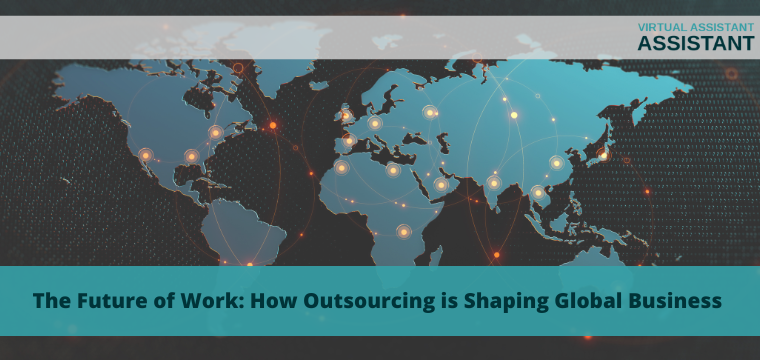 The Future of Work: How Outsourcing is Shaping Global Business
The Future of Work: How Outsourcing is Shaping Global Business
The workforce does not look like it looked ten years ago. Technology, global networks and new business models have changed how companies obtain work. Several companies are now working with partners all over the world instead of keeping everything at home.
Outsourcing is not new, but the way it is used today is different. It’s no longer about budget cuts. It’s about flexibility, talent and speed. And it forms the future of work in powerful ways.
Table of Contents
Why does outsourcing matter today?
Companies face frequent pressure to reduce more with less. By keeping the costs under control, they must produce results quickly. At the same time, they require skills that are not always available at home.
Outsourcing helps in this balance. This gives companies a chance to focus on what they do best when leaving special work for others. For example, a start -up can focus on the manufacture of your product by outsourcing customer help or IT assignments. A large company can use outsourcing to handle probation, marketing or management of the supply chain.
The main advantage is likes – Companies can decide what to keep in the house and what to outsource, depending on goals and resources.
From cost savings to strategic growth
Previously, outsourcing was often seen as a way of cutting the expenses. Companies sent work abroad to reduce labor costs. While savings still matter, the conversation has expanded.
The epidemic intensified the distance work, and with it outsourcing became more natural. If the teams already worked from different places, why didn’t the model increase the global partners?
Now, outsourcing is also about –
- Scalability – companies can grow without continuing heavy overheads.
- Access to skills – Experts are available worldwide, from software engineers to accountants.
- Speed – projects can move quickly with teams in time zones.
- Flexibility – Outsourcing operating spread and reduces the risk associated with a place.
This shift shows that outsourcing is not just a financial decision. It’s part of a broader business strategy.
The role of technology
Technology has played a huge role in making outsourcing more effective. Cloud platforms, project management tools and video conferences make it easier to collaborate on boundaries.
When the necessary tasks required by face to face can now be done with a few clicks.
Artificial intelligence and automation also add new teams. Some regular work is controlled by software, while people focus on tasks that require creativity and problems. Outsourcing partners often combine both human expertise -Both that offers automation equipment.
This mix of people and technology is shaping how global business operates.
Why does the Philippines stand out?
One country that stands out in this trend is the Philippines. Business outsourcing services in Philippines have become a key part of many global companies’ strategies.
There are a few reasons for this. First, the Philippines has a large, skilled working group with strong English communication ability. This makes it easier for international companies to collaborate.
Second, the time field works well for 24/7 operations. A company in the United States or Europe can run around the clock by working with teams in the Philippines.
Third, the outsourcing industry is well established there. From customer service to that, the Philippines has created a strong reputation for credibility. This is why this is often one of the first places when companies consider it when they think of outsourcing.
Outsourcing and the future of work
So, where does the outsourcing work fit in the big picture of the future of work?
Hybrid team
More companies will use a mixture of into houses and outsourced employees. A marketing department can have a core team locally and can be designed or analyzed outsourced abroad.
Pay attention to skills, not location
Distance work has shown that talent does not have to sit in the same office. Companies will look for the best people for the job, wherever they are.
Outsourcing as innovation
By working with global partners, companies can bring new ideas and approaches that they cannot find at home.
Support for small businesses
Start -ups and small companies often lack resources. By providing outsourcing level access to the same expertise as major participants in the playground.
This development shows that outsourcing will remain centrally how businesses grow and are favorable.
Challenges to keep in mind
Outsourcing is of course not without challenges. Companies still need to manage communication with the time sector and cultural differences. Data security and compliance are also concerns, especially with sensitive information.
Success depends on choosing the right partner and setting clear expectations. It’s not about leaving the tasks and forgetting them. It’s all about building relationships and treating outsourcing as part of the team.
A balanced approach
The future of the work is not about outsourcing everything. It’s all about balance. Companies must decide which tasks are original for identification and can be better managed by external experts.
Outsourcing provides flexibility. It provides space for development without a full time. But it is the best feature when combined with a strong strategy and communication.
Final thoughts
Outsourcing costs have moved far beyond savings. It is now a tool for development, flexibility and global cooperation. For many companies, this is not a side option; This is part of how they work.
The emergence of global outsourcing, especially in places like the Philippines, shows how a connected business has become. Companies embrace this model and can use talent, now fast scale and remain competitive in changing markets.
The future of the work will continue to be the size of these options. And outsourcing, the right way, will remain at the center of that story.
